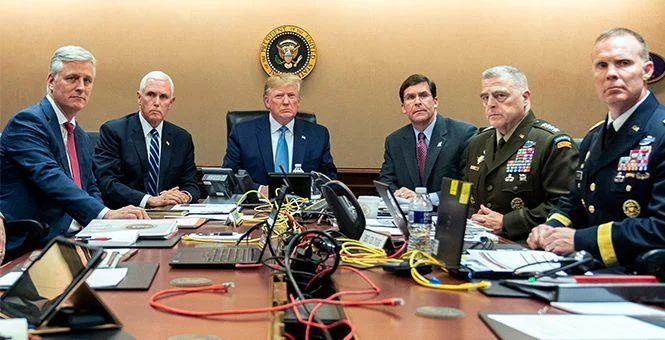Key questions following killing of Iranian military leader Oassim Suleimani By Joshua Turner
General Qassim Suleimani, one of the most important figures in Iranian politics, was killed early Friday, January 3rd by a United States drone strike on the orders of President Donald Trump. This follows months of spiraling tensions between the two countries, which began with President Trump’s decision to pull the United States out of the Iran nuclear agreement (also known as the Joint Comprehensive Plan of Action or JCPOA) and in recent days included Iranian instigated attacks on the United States embassy in Baghdad, Iraq. The targeted killing of an Iranian official is likely the most important foreign policy decision by the United States since the invasion of Iraq in 2003 and will likely have drastic consequences for the region and the world in the weeks and months to come.
Photo from Iraqi Prime Minister Press Office
Who was Qassim Suleimani?
General Suleimani was unquestionably one of the most important Iranian military and political figures, with some believing he was secondary in importance only to the Supreme Leader himself. Suleimani was in charge of the Revolutionary Guards Quds Force as well as almost all of Iran’s foreign military forces, which included Iranian backed militias across the Middle East. In addition to his military genius, which was recognized by friend and foe alike, he was also an important figure inside Iran politically and culturally, seen by many as a hero and potential future president. In short, his death would be the rough equivalent of Iran killing someone like a James Mattis when was Secretary of Defense.
How and why did this happen?
Suleimani was ultimately responsible for numerous American deaths during the Iraq insurgency as well as numerous civilian deaths in the Syria, Lebanon, and Iraq. He was among a number of Iranian officials to be designated a terrorist by the United States and Israel in 2011 though ironically in recent years found himself on the same side as the U.S while fighting against ISIS.
The United States had the opportunity to take out Suleimani on more than one occasion in the past but had ultimately decided against it given the uncertainty surrounding the Iranian response and fears of escalating an already dangerous conflict.
There is no obvious rationale for why Suleimani was killed now, with conflicting reports coming out of Washington that this was a measure meant to curb future escalation and that Suleimani was planning an imminent attack on the American embassy and that this was a preemptive strike of sorts. While this could make the attack conceivably justifiable under international law, the administration has yet to produce any evidence that this was the case. It is also unclear, given the sheer amount of lying and undermining of institutions engaged in by the administration, the amount of trust both Americans and the global community would give such evidence.
U.S. Secretary of State MIke Pompeo
What does this mean going forward?
It remains unclear what the ramifications of this action will be; the Supreme Leader of Iran has called for three days of mourning and revenge against America. The United States has sent an additional 3,500 troops to the Middle East and has called on its citizens in Iraq to leave the country immediately. Given the disparity in military power between the two nations, it seems unlikely that Iran would seek to engage in a traditional war scenario and will instead likely opt for continued terrorist and cyber strikes against American targets.
It is also unclear how America’s Western allies will respond, especially given that they remain in the JCPOA and will likely seek to keep Iran in it; France and the United Kingdom have already called for a de-escalation while Russia, a major Iranian ally, has decried what it sees as ‘destabilizing military adventurism.’
The reality is that there is no evidence this strike was part of a larger American plan for the region and was, in the same fashion as much of what is done in the Trump administration, a spur of the moment decision. There are very real benefits to Suleimani being eliminated; he was unquestionably a negative influence in the region, responsible for thousands of deaths of both American soldiers and innocent civilians. He was also one of the most formidable commanders in the region and his tactical brilliance will be difficult replace. As the adage goes ‘the world is likely a better place without him.’
But the shortsighted killing of a major military and political figure without taking into account the broader consequences seems foolish at best; consider for instance that this action has had the effect of bringing together Iranian hardliners and moderates right at the moment when the depressed economic situation in the country was potentially driving a wedge between them. This action will also likely harm our relations with the government in Iraq given that it happened in their country without their permission.
We may not know for months or even years what the actual consequences of the action might be, but it is clear that a dangerous situation with Iran has become exponentially more so.
Domestic U.S. politics
As with all things in an election year, it is impossible to detach this event from what is going on here at home, with both a presidential election and impeachment trial in the senate looming. This will undoubtedly elevate foreign policy in a campaign that has largely focused on domestic issues and Democratic candidates will be forced to articulate a more substantial foreign policy vision that takes into account increased tensions with both Iran and North Korea.
It is also conceivable that, should escalation continue in the coming days and weeks, the impeachment trial of Donald Trump could be pushed back indefinitely, though it remains unclear if that is something the president would actually want.
Joshua Turner ( @joshuaaturner84) is a PhD Student in the Department of Political Science at the University at Buffalo







